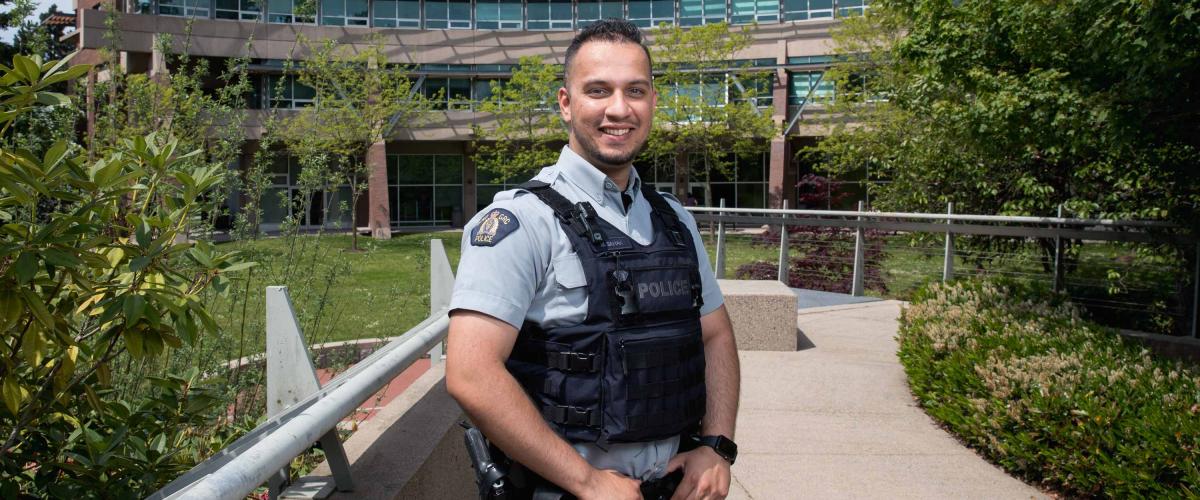Mansoor Sahak hasn’t wasted any time in pursuing his goal of giving back to Canada as a police officer.
Two years after graduating with a Law Enforcement Studies Diploma (LESD) at the Justice Institute of British Columbia (JIBC), he was hired by the Royal Canadian Mounted Police (RCMP) in early 2017. Then in his first year as a general duty officer with North Vancouver RCMP, he took 42 impaired drivers off the road, and was recognized as a member of “Alexa’s Team.”
Named after four-year-old Alexa Middelaer who was killed by a drunk driver in 2008, the honour is awarded to police officers in BC who make an extraordinary contribution to reducing the number of impaired drivers on the province’s roads.
Mansoor believes the lessons and skills he gained from the LESD program at JIBC was a great foundation in his pursuit for a law enforcement career, along with his experience as an RCMP auxiliary and a bylaw officer, volunteering with the Vancouver Police Department, and being part of police judo at JIBC.
He also had a deeper purpose in his career choice. It all comes back to his family’s experience as refugees, and his desire to give back to the country that took them in.
You realize that was you at one point, that could have been you
Mansoor knew he wanted to be a police officer ever since volunteering at a community policing station and attending the New Westminster Police Department’s Student Police Academy.
He always figured it was because policing is exciting and different from most careers. But eventually, he realized he also wanted to respond to the privilege of living in Canada.
He was too young to remember much of it, but his parents have told him stories. Of how his family fled Afghanistan when the Taliban took power and the war started. How they left almost everything behind. How they escaped to Pakistan where his family of seven shared a home with three other families.
Mansoor does remember how, at age nine, he and his family came to Canada as refugees, knowing no English, having to rebuild their lives. His parents would often talk about the destruction taking place in their native country, and what continues to be lost.
“You realize that was you at one point, that could have been you,” he said. “But you made it here; it’s literally a lottery ticket for my family to come out here.”
To help him in his pursuit of a policing career, he looked to the LESD program.
“I absolutely loved it, everything about it. The teachers all have first-hand experience, they’re really there to help you succeed, guide you through. They all talk from experience; they’re smaller classes; you have a lot of one-on-one time with teachers. The school really prepared me for the real world.”
Mansoor said his instructors were really helpful and are there to help students succeed, setting the bar high.
“You put in 110 per cent, that’s what you’ll get back. I knew that if I want to succeed and become a member one day that I really have to work my butt off to achieve it.”
With his experience, culture and language skills, he hopes to help bridge the gap between local police and newcomers from countries where police are often not liked or trusted.
“All the refugees that are coming, especially from Syria, I want to share my experience with them and say, ‘you know what, you’ve made it this far, I’ve been in your shoes, I’ve been where you are, you can make it, you know?’”
